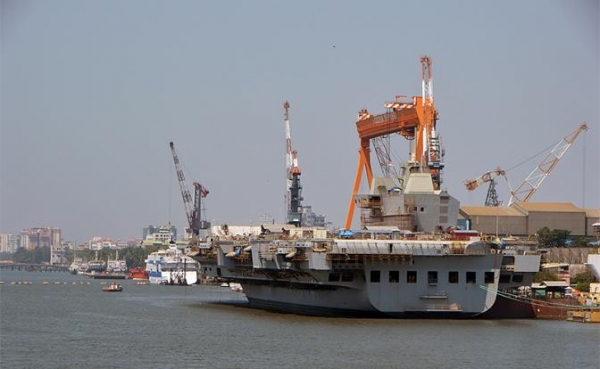
In just the outbreak of armed conflict between India and Pakistan (the most serious after the “Kargil crisis,” 1999) drew the attention of a relatively new point in the definition that has the word “water”.
In this regard it is useful to remind that the expression “water – source of life” is a key meme not only a variety of world religions, but also science, and most importantly, real life.
In the last 10-15 years, the theme of the shortage of fresh water in some regions of the world from the sphere of academic discussion moved to media. What is obvious testimony to its regular updating by the current policy.
The above meme is the most direct way reflects the reality in the most populated regions of the world, for example, in South East Asia and the Indian subcontinent. At the end of September the famous slogan (in slightly altered form) “off the water” clearly came from the lips of the Prime Minister of India Narendra modi.
If the leader of one of the world’s leading powers resort to threats of the use of such “weapons” (hardly less destructive than nuclear), it means that its something to “get”. And it is already difficult unbearable.
Indicated “something” was a night attack on 18 September a group of terrorists on the Indian military barracks in URI, located near the so-called “ceasefire Line”, that is quaternity that separates today from each other India and Pakistan. During the battle killed 19 Indian soldiers and 4 attackers of the terrorist, infiltrator, believed to be in India from Pakistan.
This attack has provoked another serious Indo-Pakistani armed conflict, which has used artillery. In India reported on the “surgical operations on the adjacent territory” with the help of special forces on the helicopters.
In turn, Pakistan has blocked access to all Indian media and warned about the possibility of using nuclear weapons (“in response to a full-scale attack India”).
As to the real effectiveness of various episodes of the conflict parties ‘ views radically differ. However, as always in any war.
The terrorist attack in URI, apparently, was nothing like revenge of the Indian military, a month earlier, hard to suppress another outburst of the inhabitants of the several towns of the Kashmir valley – one of the three administrative units of the Indian state of Jammu and Kashmir.
The main feature of the Kashmir valley, among other administrative units of India is that over 97% of local residents are Muslim. In one way or another they feel sympathy for the population of the Pakistani part of the once unified Principality of Kashmir.
In Kashmir valley there are various protest movements seeking at least different purposes. Mass demonstrations, as a rule, severely repressed by the gendarmerie (which often joins the army), which are subordinate to the Central government. The result of the suppression of the August talks that S. N. was the death of about a hundred and wounding more than thousands of Indian Kashmiris.
It is clear why the Indian Prime Minister to “get” the terrorist attack in URI. The fact is that in India the fresh memory of the attack on the airbase near the town of Pathankot in neighbouring Punjab, carried out by terrorists at the beginning of January 2016 On the scale it was the second terrorist attack after the famous terrorist attack of 2008 in Mumbai.
Already at the beginning of 2016 in India wondered whether or not to maintain any relations with the official authorities of Pakistan who are unable (or unwilling) to exercise effective control based on the territory of the country fighting Islamist groups.
The question arises, what can be when this time as a “response” to the Indian leadership resorted to open threats in the area of supply of a neighbouring country.
India and Pakistan are parties to a bilateral Treaty, waters of the Indus, concluded in 1960 brokered by the world Bank. Under the “Indus water” meant several tributaries, forming the basin one of the largest rivers of the Indian subcontinent, playing a vital role in the functioning of both States, but especially Pakistan.
As to what specifically could lead these threats, the experts there is no consensus and it is unlikely that it was formed in the Indian government. Refers to the possibility of unilateral termination of the Treaty or the manipulation of India sewage waters entering the territory of Pakistan.
Undeniable is one. Not only the Agreement of 1960, but any major (artificial) reduction of the flow to Pakistan the water of Indus basin is the right way to full-scale war between two de facto nuclear powers. With a certain probability of connecting to her “older brothers” in the United States and China.
Therefore, the statement N. Modi is about “the impossibility of the simultaneous flow of water and blood” is unlikely to have significant practical consequences. And anyway, such public rhetoric is unlikely to be related to future historians of the Board N. Modi for his foreign policy successes. At least because of the already made threats from China about the possibility of overlap of the Tibetan tributaries of the Brahmaputra – another important river of the Indian subcontinent.
It should be noted the uniqueness of China this act of water blackmail in relations regional opponent. Anything like this is still not mentioned in his difficult relations with its southern neighbors.
Monitoring using built in Tibet dams, the intensity of the water flow of the Mekong, without exaggeration, the river of life for the countries of Indochina, the PRC leadership strongly demonstrates the recent efforts to accommodate their interests. To considerable political advantage.
But the world, apparently, really “psychotic”. Now it is possible that someone will come to mind to limit the flow of air in the country of the enemy, for example, with the help of thousands of wind turbines installed in the border region. Again, a lot of electricity can be obtained. Environmentally friendly.








